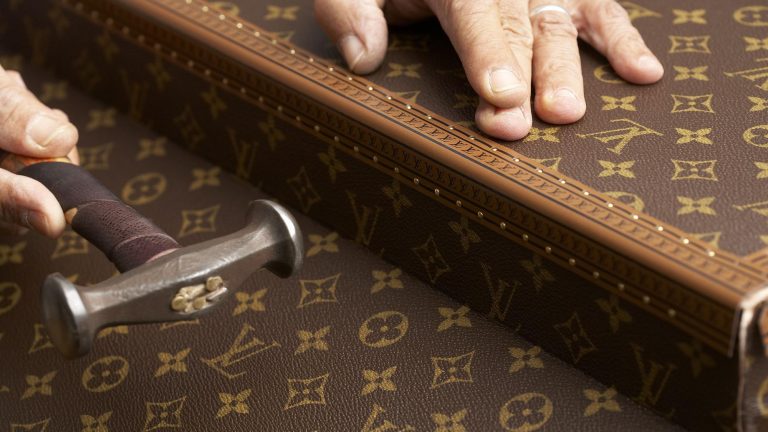
LVMH Moët Hennessy Louis Vuitton, the world’s largest luxury goods conglomerate, reported a 3% organic revenue decline in the first quarter of 2025, with sales totaling €20.3 billion ($23.08 billion), falling short of analyst expectations for 2% growth.
The disappointing results, announced on Monday, underscore the mounting pressures from U.S. President Donald Trump’s tariff policies, which are rippling through the luxury sector and beyond, while a new threat emerges from Chinese manufacturers flooding TikTok with discounted luxury-style goods.
LVMH’s revenue shortfall is a stark indicator of the fallout from Trump’s aggressive trade agenda, which has sparked fears of a U.S. recession and disrupted global markets. The administration’s recent tariff announcements, including a proposed 20% levy on European fashion and leather goods and a 31% duty on Swiss-produced watches, have created uncertainty for luxury brands reliant on transatlantic trade. Although Trump paused most tariffs for 90 days last week, imposing a blanket 10% duty instead, the volatility has already dampened consumer confidence and complicated supply chains.
Register for Tekedia Mini-MBA edition 19 (Feb 9 – May 2, 2026).
Register for Tekedia AI in Business Masterclass.
Join Tekedia Capital Syndicate and co-invest in great global startups.
Register for Tekedia AI Lab.
LVMH’s finance chief, Cecile Cabanis, told analysts on Monday, “These days, parameters are changing every hour,” highlighting the challenges of navigating a trade environment marked by unpredictability. The company’s U.S. sales fell 3% in Q1, driven by weaker performance at its mass-market retail chain Sephora and in beauty products and drinks categories. High-end fashion and leather goods, including brands like Louis Vuitton, showed resilience, but the broader market slowdown signals trouble ahead.
The fashion and leather goods division, which accounts for nearly half of LVMH’s sales and over 75% of its profit, posted a 5% organic sales decline, missing expectations for a flat performance. Louis Vuitton outperformed its peers, but Dior lagged, with Bernstein analysts noting that changes in creative direction at the brand are “slow to appear.” The wines and spirits division, home to Hennessy cognac and Krug champagne, saw a 9% drop, reflecting cautious spending among U.S. consumers wary of economic uncertainty.
Ripple Effects Across Sectors
The impact of Trump’s tariff wars is not confined to luxury goods. Industries from automotive to consumer electronics are bracing for higher costs and supply chain disruptions, as tariffs threaten to inflate prices and erode profit margins. Europe’s luxury players, including Hermès, Kering, and Prada, had pinned hopes on wealthy American shoppers to offset weak demand in China, but fears of a prolonged U.S. economic slowdown are dimming prospects for a sector already grappling with its longest slump in years.
Analysts at RBC warned that LVMH’s results “amplify investor concerns around underlying demand recovery,” predicting further earnings cuts across the luxury sector due to tariff-related risks. The broader market echoed these concerns, with LVMH’s New York-listed depositary receipts plunging 7.5% after the results were released on Monday. The Stoxx Europe Luxury 10 Index, which tracks major luxury firms, has also trended downward, reflecting fears that trade barriers could choke off growth.
Beyond luxury, retailers like Amazon are intensifying competition. Cabanis noted that Amazon’s “very aggressive” pricing strategy hurt Sephora’s performance in the U.S., a sign that tariff-induced cost pressures are forcing companies to compete more fiercely on price, even in premium markets. This dynamic is squeezing margins and raising questions about the sustainability of luxury’s high-price model in a tariff-heavy world.
Chinese Manufacturers Disrupt via TikTok
Adding to LVMH’s woes, Chinese manufacturers are leveraging TikTok to hawk luxury-style goods at massive discounts, targeting consumers in Europe and the United States directly. These producers, often operating outside traditional retail channels, offer handbags, jewelry, and apparel that mimic high-end designs at a fraction of the cost. Videos showcasing “dupes” of Louis Vuitton bags or Bulgari-inspired accessories have gone viral, with some sellers reporting tens of thousands of orders monthly.
Industry experts believe this trend could erode the exclusivity that defines luxury brands.
Social media posts highlight growing consumer interest in these affordable alternatives, with some users praising the quality and others debating the ethics of buying knockoffs.
For LVMH, which owns Louis Vuitton, Dior, and Tiffany & Co., this development threatens to undercut pricing power, particularly in markets already softened by tariffs. The company has invested heavily in brand prestige and intellectual property enforcement, but the scale and speed of TikTok’s reach pose a new challenge. In China, LVMH’s sales fell 11% in Q1.
LVMH is exploring ways to mitigate tariff impacts, including expanding production in the U.S., where it operates three Louis Vuitton factories and Tiffany workshops. However, its high-profile Texas facility has faced persistent production issues, ranking among the worst-performing globally, according to Reuters. Cabanis remained cautious about scaling U.S. manufacturing.
“We’ll see at what pace and how much we want that to evolve,” Cabanis said.
However, LVMH’s scale and diversified portfolio position it better than most to weather the storm. Experts believe that the company’s ability to command premium prices for iconic products like Louis Vuitton handbags and Hennessy cognac provides a buffer against rising costs.



